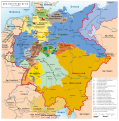Treaty of Munich (1816)
The Treaty of Munich of April 14, 1816, on the one hand, normalized the tense relationship between the Kingdom of Bavaria and the Empire of Austria . On the other hand, it led to considerable changes in the area.
prehistory
During the Napoleonic coalition wars , the Electorate of Bavaria , following France, became a member of the Rhine Confederation and a kingdom . In addition, the country was able to record considerable territorial gains, not least at the expense of Austria.
The Treaty of Ried of 1813 sealed Bavaria's transfer to the camp of the anti-Napoleonic alliance while at the same time guaranteeing Bavarian sovereignty. After the end of the Congress of Vienna , it was now a matter of putting the relationship between the two countries on a new basis. On the Austrian side, Baron Wacquant-Geozelles led the negotiations. On the Bavarian side, Maximilian von Montgelas and Aloys von Rechberg signed the Munich Treaty.
After the Congress of Vienna, Austria's territorial scope was largely restored, as it had been before the wars. The remote Austrian Netherlands and Upper Austria were renounced, instead Salzburg and the Innviertel were to be acquired permanently. However, until almost the end of the congress there was a plan to leave both areas with the Kingdom of Bavaria and to create a new Upper Austria on the Rhine , which according to today's terms would have included Rheinhessen , the Palatinate and Saarland . This was then waived in favor of state unity.
content
Bavaria returned the areas, the Hausruckviertel and Innviertel , as well as the Amt of Vils in Tirol, lost with the Peace of Teschen in 1779 and regained in the Peace of Schönbrunn in 1809, to Austria and also ceded the Duchy of Salzburg to Austria. In return, Bavaria received the Palatinate on the left bank of the Rhine partly new, partly back, plus Hammelburg , Brückenau , Bieberstein and Redwitz . The territory of the former prince provostie Berchtesgaden and the areas of the so-called Rupertiwinkel after 1816 remained with Bavaria. Bavaria received compensation for the assignments of territory provided for in the Treaty of Ried and also received a share of the French war contributions. The contract also regulated other issues.
In some secret articles, agreements were made about the Neckar, Main and Tauber districts belonging to the Grand Duchy of Baden , as well as about an army road through the Grand Duchy of Hesse , and Bavaria was guaranteed payments of 100,000 guilders a year.
The Baden-Bavarian border dispute over the Palatinate on the right bank of the Rhine was then decided in favor of Baden at the Aachen Congress in 1818 .
cards
Bavaria in the German Confederation 1816, (according to the treaty)
swell
- GM Kletke: The State Treaties of the Kingdom of Bavaria ...: from 1806 up to and including 1858 . Pustet, 1860, Division II. State treaties with regard to sovereignty, territorial and border treaties 27., pp. 310–324 (cf. Pragmatic Table of Contents . Wikisource)
literature
- Volker Schäfer: Munich Treaty. In: Gerhard Taddey (Hrsg.): Lexicon of German history . People, events, institutions. From the turn of the times to the end of the 2nd World War. 2nd, revised edition. Kröner, Stuttgart 1983, ISBN 3-520-80002-0 , p. 851.

